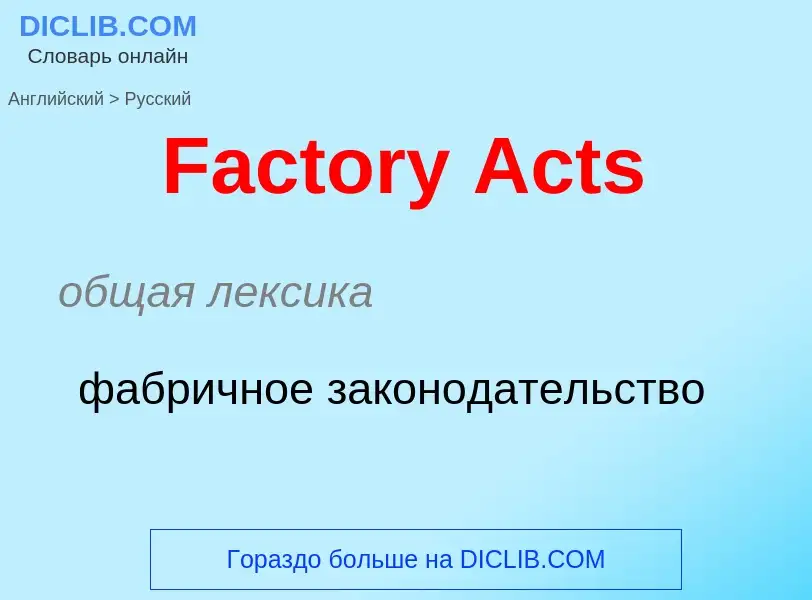Перевод и анализ слов искусственным интеллектом ChatGPT
На этой странице Вы можете получить подробный анализ слова или словосочетания, произведенный с помощью лучшей на сегодняшний день технологии искусственного интеллекта:
- как употребляется слово
- частота употребления
- используется оно чаще в устной или письменной речи
- варианты перевода слова
- примеры употребления (несколько фраз с переводом)
- этимология
factory acts - перевод на русский
общая лексика
фабричное законодательство
существительное
общая лексика
спутник, сделанный на основе технологии усовершенствованных коммуникаций
синоним
['fækt(ə)riʃip]
общая лексика
плавучий рыбозавод
обрабатывающее судно
существительное
общая лексика
плавучий рыбозавод
строительное дело
технологическая установка
завод-изготовитель
Определение
Википедия

The Factory Acts were a series of acts passed by the Parliament of the United Kingdom beginning in 1802 to regulate and improve the conditions of industrial employment.
The early Acts concentrated on regulating the hours of work and moral welfare of young children employed in cotton mills but were effectively unenforced until the Act of 1833 established a professional Factory Inspectorate. The regulation of working hours was then extended to women by an Act of 1844. The Factories Act 1847 (known as the Ten Hour Act), together with Acts in 1850 and 1853 remedying defects in the 1847 Act, met a long-standing (and by 1847 well-organised) demand by the millworkers for a ten-hour day. The Factory Acts also included regulations for ventilation, hygienic practices, and machinery guarding in an effort to improve the working circumstances for mill children.
Introduction of the ten-hour day proved to have none of the dire consequences predicted by its opponents, and its apparent success effectively ended theoretical objections to the principle of factory legislation; from the 1860s onwards more industries were brought within the Factory Act.




![[[Cromford mill]] as it is today. [[Cromford mill]] as it is today.](https://commons.wikimedia.org/wiki/Special:FilePath/Cromford 1771 mill.jpg?width=200)


![Working day ends at [[Tampella]] factory in [[Tampere]], Finland in 1909 Working day ends at [[Tampella]] factory in [[Tampere]], Finland in 1909](https://commons.wikimedia.org/wiki/Special:FilePath/Työpäivä päättyy Tampellassa.jpg?width=200)
![Entrance to the [[Venetian Arsenal]] by [[Canaletto]], 1732. Entrance to the [[Venetian Arsenal]] by [[Canaletto]], 1732.](https://commons.wikimedia.org/wiki/Special:FilePath/View of the entrance to the Arsenal by Canaletto, 1732.jpg?width=200)
![Interior of the [[Lyme Regis]] watermill, UK (14th century). Interior of the [[Lyme Regis]] watermill, UK (14th century).](https://commons.wikimedia.org/wiki/Special:FilePath/WaterMill Interior MotionBlur.jpg?width=200)
![A factory worker in 1942 [[Fort Worth, Texas]], United States. A factory worker in 1942 [[Fort Worth, Texas]], United States.](https://commons.wikimedia.org/wiki/Special:FilePath/WomanFactory1940s.jpg?width=200)
![Reconstructed historical factory in [[Žilina]] ([[Slovakia]]) for production of safety matches. Originally built in 1915 for the business firm ''Wittenberg and son''. Reconstructed historical factory in [[Žilina]] ([[Slovakia]]) for production of safety matches. Originally built in 1915 for the business firm ''Wittenberg and son''.](https://commons.wikimedia.org/wiki/Special:FilePath/Zilina zapalkaren.jpg?width=200)
![Zeche Ewald in [[Herten]], exterior (2011) Zeche Ewald in [[Herten]], exterior (2011)](https://commons.wikimedia.org/wiki/Special:FilePath/Herten - Zeche Ewald 12 ies.jpg?width=200)
![Zeche Ewald in [[Herten]], interior (2011) Zeche Ewald in [[Herten]], interior (2011)](https://commons.wikimedia.org/wiki/Special:FilePath/Herten - Zeche Ewald 14 ies.jpg?width=200)
![Coldharbour Mill]] textile factory, built in 1799. Coldharbour Mill]] textile factory, built in 1799.](https://commons.wikimedia.org/wiki/Special:FilePath/Fox Brothers, Coldharbour Mill, Uffculme - geograph.org.uk - 97156.jpg?width=200)
![[[Adolph von Menzel]]: ''Moderne Cyklopen'' [[Adolph von Menzel]]: ''Moderne Cyklopen''](https://commons.wikimedia.org/wiki/Special:FilePath/Adolph Menzel - Eisenwalzwerk - Google Art Project.jpg?width=200)
![[[New Lanark]] mill [[New Lanark]] mill](https://commons.wikimedia.org/wiki/Special:FilePath/New Lanark buildings 2009.jpg?width=200)
![Woolwich Arsenal]] late 1800s Woolwich Arsenal]] late 1800s](https://commons.wikimedia.org/wiki/Special:FilePath/Workers in the fuse factory Woolwich Arsenal Flickr 4615367952 d40a18ec24 o.jpg?width=200)
![The assembly plant of the [[Bell Aircraft Corporation]] at [[Wheatfield, New York]], United States, 1944 The assembly plant of the [[Bell Aircraft Corporation]] at [[Wheatfield, New York]], United States, 1944](https://commons.wikimedia.org/wiki/Special:FilePath/Airacobra P39 Assembly LOC 02902u.jpg?width=200)
![Rouge]] Tool & Die works, 1944 Rouge]] Tool & Die works, 1944](https://commons.wikimedia.org/wiki/Special:FilePath/River Rouge tool and die8b00276r.jpg?width=200)
![Hyundai]]'s Assembly line (about 2005) Hyundai]]'s Assembly line (about 2005)](https://commons.wikimedia.org/wiki/Special:FilePath/Hyundai car assembly line.jpg?width=200)
![Danisco Sweeteners]] factory in [[Kotka]], Finland (2015) Danisco Sweeteners]] factory in [[Kotka]], Finland (2015)](https://commons.wikimedia.org/wiki/Special:FilePath/Daniscon Kotkan tehdas 1.jpg?width=200)
![Michoud rocket factory]] in the 1960s Michoud rocket factory]] in the 1960s](https://commons.wikimedia.org/wiki/Special:FilePath/Apmisc-MSFC-6870792.jpg?width=200)
![Space station modules being manufactured in the [[Space Station Processing Facility]] Space station modules being manufactured in the [[Space Station Processing Facility]]](https://commons.wikimedia.org/wiki/Special:FilePath/NASA SSPF factory panorama.jpg?width=200)
![A ladle pouring molten steel into a [[Basic Oxygen Furnace]] for secondary steelmaking, inside a [[steel mill]] factory in Germany A ladle pouring molten steel into a [[Basic Oxygen Furnace]] for secondary steelmaking, inside a [[steel mill]] factory in Germany](https://commons.wikimedia.org/wiki/Special:FilePath/ThyssenKrupp_Duisburg_016.jpg?width=200)
![Airplanes being manufactured at the [[Boeing Everett Factory]] assembly line Airplanes being manufactured at the [[Boeing Everett Factory]] assembly line](https://commons.wikimedia.org/wiki/Special:FilePath/At_Boeing's_Everett_factory_near_Seattle_(9130160595).jpg?width=200)
.jpg?width=200)
![Russian icon]] by [[Fyodor Zubov]], 1660 Russian icon]] by [[Fyodor Zubov]], 1660](https://commons.wikimedia.org/wiki/Special:FilePath/ApostleFedorZubov.jpg?width=200)
![Acts 1:1–2a from the 14th century [[Minuscule 223]] Acts 1:1–2a from the 14th century [[Minuscule 223]]](https://commons.wikimedia.org/wiki/Special:FilePath/Minuscule 223 (GA) f11r.jpg?width=200)
![''Saint Paul Writing His Epistles'', ascribed to [[Valentin de Boulogne]], 17th century ''Saint Paul Writing His Epistles'', ascribed to [[Valentin de Boulogne]], 17th century](https://commons.wikimedia.org/wiki/Special:FilePath/Probably Valentin de Boulogne - Saint Paul Writing His Epistles - Google Art Project.jpg?width=200)
![Paul's conversion, from ''Livre d'Heures d'Étienne Chevalier'' (c. 1450–1460), [[Jean Fouquet]], in the [[Château de Chantilly]] Paul's conversion, from ''Livre d'Heures d'Étienne Chevalier'' (c. 1450–1460), [[Jean Fouquet]], in the [[Château de Chantilly]]](https://commons.wikimedia.org/wiki/Special:FilePath/Saint Paul.jpg?width=200)
 -Deutsche Fischfang Union- Cuxhaven 2008 by-RaBoe 01.jpg?width=200)
![Hull]], England Hull]], England](https://commons.wikimedia.org/wiki/Special:FilePath/ArcticWarriorTrawlerPic1.jpg?width=200)

